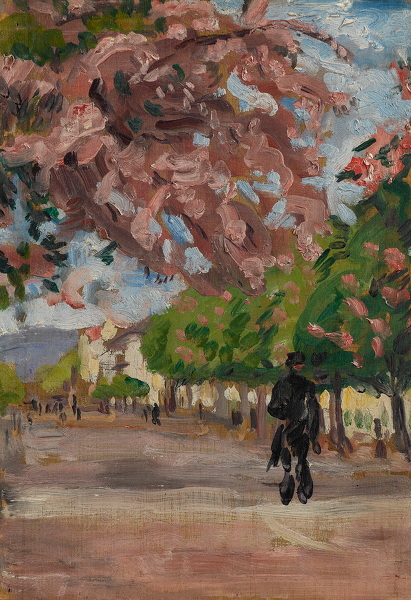

 Hover over the painting to magnify (there may be an initial delay while the magnified image is loaded)
Hover over the painting to magnify (there may be an initial delay while the magnified image is loaded)Arthur Studd (1863 - 1919):
The Boulevard
Unframed (ref: 2781)
Oil on panel,
See all works by Arthur Studd oil panel Highlights of 20/21 Art Fair Metropolitan
Exhibited: (?) Arthur Studd, Alpine Club Gallery, London, June 1911
It’s commonly believed that Paul Gauguin worked in isolation in Tahiti, living in self-imposed exile from France and far from the reach of the European avant-garde. But from 1897 to 1898 Gauguin was joined in Tahiti at Papete by a British painter, Arthur Haythorne Studd (1863 – 1919). It was Studd’s wish, as he declared in a letter to his friend James McNeil Whistler (dated 22 June, 1897), to establish a ‘Studio of the South Seas’
Arthur Studd studied art at the Slade School under Legros in 1888-89 and in Paris at the Academie Julian. He quickly immersed himself in an artistic circle which included, Degas, Puvis de Chavannes,Charles Conder and James McNeill Whistler. He also met and befriended Gauguin in Le Pouldou, Brittany in 1890. From 1894 to 1895 Studd worked with Whistler in London where they were neighbours in Cheyne Walk, Chelsea.A man of independent means and a collector Studd bequeathed three major works by Whistler to the National Gallery, London (now in the Tate Collection): Symphony in White, No. 2: The Little White Girl; The Fire Wheel; and Nocturne: Blue and Silver – Cremorne Lights).
Studd held one man shows during his lifetime at the Goupil Gallery in 1896, The Baillie Gallery in 1906, The Alpine Club Gallery, London in 1911 and The City Museum of St. Louis, USA in 1910. Exhibited at the New English Arts Club.He excelled in producing small wooden panels painted en plein air, much inspired by the Post Impressionists. Panels by
Studd of a similar size are in the collection of Tate Britain.
A biography of this important British painter and collector, whose story remains to be told, is being prepared by Dr Prue Ahrens University of Queensland.
 British Impressionists
British Impressionists SOLD
SOLD




